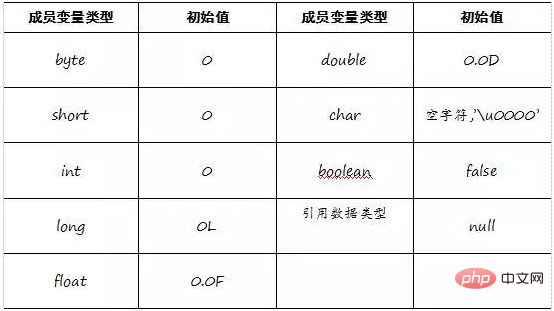How to initialize an array in java

1. What is initialization
In Java program development, arrays are initialized before they are used. This is because arrays are reference types. Declaring an array only declares a reference type variable, not the array object itself. As long as the array variable points to a valid array object, the array variable can be used in the program to access the array elements. The so-called array initialization is the process of making the array name point to the array object. This process is mainly divided into two steps. The first is to initialize the array object, that is, allocate memory space and assign values to the elements in the array. The second is to initialize the array name. That is, assigning the array name a reference to the array object.
Arrays can be initialized in two ways, namely static initialization and dynamic initialization.
2. Static initialization
Static initialization means that the programmer assigns a value to each element of the array when initializing the array, and the system determines the length of the array.
There are two ways to statically initialize an array. The specific examples are as follows:
array = new int[ ]{1,2,3,4,5};
int[ ] array = {1,2,3,4,5};The above two methods can achieve static initialization of the array, in which the curly braces contain the array. Element values, separated by commas ",". Note here that simplified static initialization is only supported when array initialization is performed at the same time as the array is defined. For simplicity, it is recommended to use the second method.
3. Dynamic initialization
Dynamic initialization means that the programmer specifies the length of the array when initializing the array, and the system assigns initial values to the array elements.
Dynamic initialization of arrays, specific examples are as follows:
int[ ] array = new int[10]; // 动态初始化数组
The format in the above example will allocate a memory space for the use of the array when the array is declared. The length of the array is 10. Since each The elements are all int data types, so the memory occupied by the array in the above example is 10*4=40 bytes. Additionally, when an array is dynamically initialized, its elements are set to default initial values based on their data type. The default value of each element in the array in this example is 0. The default values of other common data types are as shown in the following table:

numerousjava training videos , all on the PHP Chinese website, welcome to learn online!
The above is the detailed content of How to initialize an array in java. For more information, please follow other related articles on the PHP Chinese website!

Hot AI Tools

Undresser.AI Undress
AI-powered app for creating realistic nude photos

AI Clothes Remover
Online AI tool for removing clothes from photos.

Undress AI Tool
Undress images for free

Clothoff.io
AI clothes remover

AI Hentai Generator
Generate AI Hentai for free.

Hot Article

Hot Tools

Notepad++7.3.1
Easy-to-use and free code editor

SublimeText3 Chinese version
Chinese version, very easy to use

Zend Studio 13.0.1
Powerful PHP integrated development environment

Dreamweaver CS6
Visual web development tools

SublimeText3 Mac version
God-level code editing software (SublimeText3)

Hot Topics
 1382
1382
 52
52
 Perfect Number in Java
Aug 30, 2024 pm 04:28 PM
Perfect Number in Java
Aug 30, 2024 pm 04:28 PM
Guide to Perfect Number in Java. Here we discuss the Definition, How to check Perfect number in Java?, examples with code implementation.
 Weka in Java
Aug 30, 2024 pm 04:28 PM
Weka in Java
Aug 30, 2024 pm 04:28 PM
Guide to Weka in Java. Here we discuss the Introduction, how to use weka java, the type of platform, and advantages with examples.
 Smith Number in Java
Aug 30, 2024 pm 04:28 PM
Smith Number in Java
Aug 30, 2024 pm 04:28 PM
Guide to Smith Number in Java. Here we discuss the Definition, How to check smith number in Java? example with code implementation.
 Java Spring Interview Questions
Aug 30, 2024 pm 04:29 PM
Java Spring Interview Questions
Aug 30, 2024 pm 04:29 PM
In this article, we have kept the most asked Java Spring Interview Questions with their detailed answers. So that you can crack the interview.
 Break or return from Java 8 stream forEach?
Feb 07, 2025 pm 12:09 PM
Break or return from Java 8 stream forEach?
Feb 07, 2025 pm 12:09 PM
Java 8 introduces the Stream API, providing a powerful and expressive way to process data collections. However, a common question when using Stream is: How to break or return from a forEach operation? Traditional loops allow for early interruption or return, but Stream's forEach method does not directly support this method. This article will explain the reasons and explore alternative methods for implementing premature termination in Stream processing systems. Further reading: Java Stream API improvements Understand Stream forEach The forEach method is a terminal operation that performs one operation on each element in the Stream. Its design intention is
 TimeStamp to Date in Java
Aug 30, 2024 pm 04:28 PM
TimeStamp to Date in Java
Aug 30, 2024 pm 04:28 PM
Guide to TimeStamp to Date in Java. Here we also discuss the introduction and how to convert timestamp to date in java along with examples.
 Java Program to Find the Volume of Capsule
Feb 07, 2025 am 11:37 AM
Java Program to Find the Volume of Capsule
Feb 07, 2025 am 11:37 AM
Capsules are three-dimensional geometric figures, composed of a cylinder and a hemisphere at both ends. The volume of the capsule can be calculated by adding the volume of the cylinder and the volume of the hemisphere at both ends. This tutorial will discuss how to calculate the volume of a given capsule in Java using different methods. Capsule volume formula The formula for capsule volume is as follows: Capsule volume = Cylindrical volume Volume Two hemisphere volume in, r: The radius of the hemisphere. h: The height of the cylinder (excluding the hemisphere). Example 1 enter Radius = 5 units Height = 10 units Output Volume = 1570.8 cubic units explain Calculate volume using formula: Volume = π × r2 × h (4
 How to Run Your First Spring Boot Application in Spring Tool Suite?
Feb 07, 2025 pm 12:11 PM
How to Run Your First Spring Boot Application in Spring Tool Suite?
Feb 07, 2025 pm 12:11 PM
Spring Boot simplifies the creation of robust, scalable, and production-ready Java applications, revolutionizing Java development. Its "convention over configuration" approach, inherent to the Spring ecosystem, minimizes manual setup, allo




